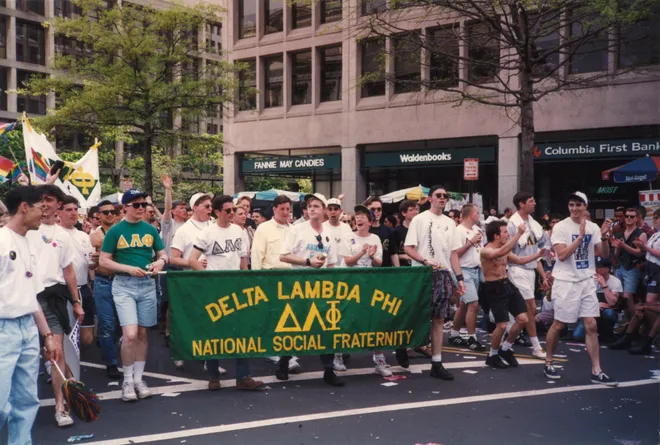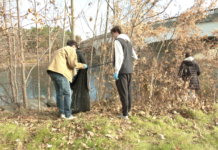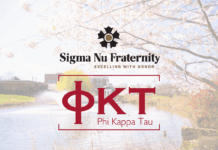
When Dylan Mason was an incoming freshman at Grand Valley State University in Allendale, Michigan, his mom dropped him off at his dormitory with three earnest admonitions. “She told me: Don’t get a tattoo, don’t get your ears pierced and don’t join a fraternity,” chuckles Mason, 20, who recently finished his second year of college and his first year as a member of the fraternity Phi Kappa Tau. Mason, who identifies as gay, had never planned to join a fraternity. He changed his mind when he overhead members of another frat laughing at him.
“During winter recruitment, I was walking through the student center and heard a comment about me rushing. They thought it was funny. At the time, that really affected me,” Mason says. “I wanted to prove them wrong. So, I made it my goal to join Greek life.”
From that initial spite came genuine fellowship. “My fraternity brothers are people who probably wouldn’t have hung out with me in high school, but now they’re some of my best friends,” says Mason, who is vice president of his fraternity. “That’s the beauty of diversity … even though I’m so different, I’m part of this community now — this brotherhood — and that’s something I think a lot of gay people are lacking.”
[…]
‘A built-in community of lifelong friendships’
A fraternity that perfectly embodies the benefits of Greek life for LGBTQ+ students is Delta Lambda Phi (DLP), which describes itself as a “Greek organization started by gay men for all men.” Inclusive by design, founder Vernon L. Strickland III established it in 1987 to create an alternative social space for Queer men whose relationships were often predicated on sex.
“In the gay world, bars and hookup culture are very pervasive. And that’s not a bad thing, but sometimes people want a little bit more,” says Brosnan Rhodes, who joined DLP in 2017 and currently serves as its trustee. “Delta Lambda Phi offers a built-in community of lifelong friendships and bonds that you can plug into at any time in your life, anywhere you go.”
And because DLP is Queer, the relationships its members create — for purposes of friendship, mentoring or professional networking — are inherently benign. “In our community, it can be hard to get close to people because we don’t always know who is safe,” Rhodes says. “I love the fact that within our brotherhood, we can form bonds and connections without worrying whether a space is safe. Because we have a shared experience, I know that my brothers in every situation are going to treat me with the same kindness and respect that I’m going to give them.”






















